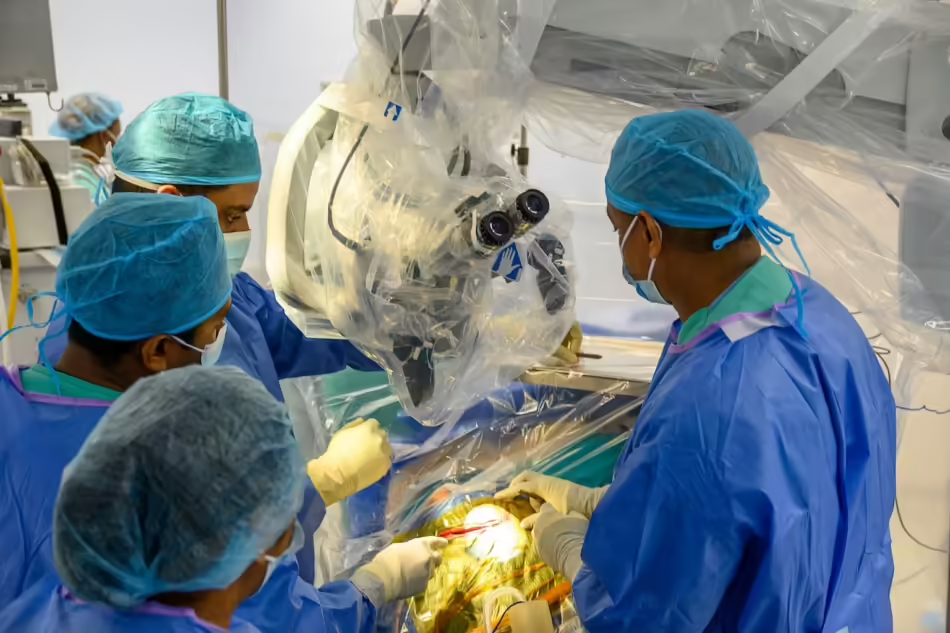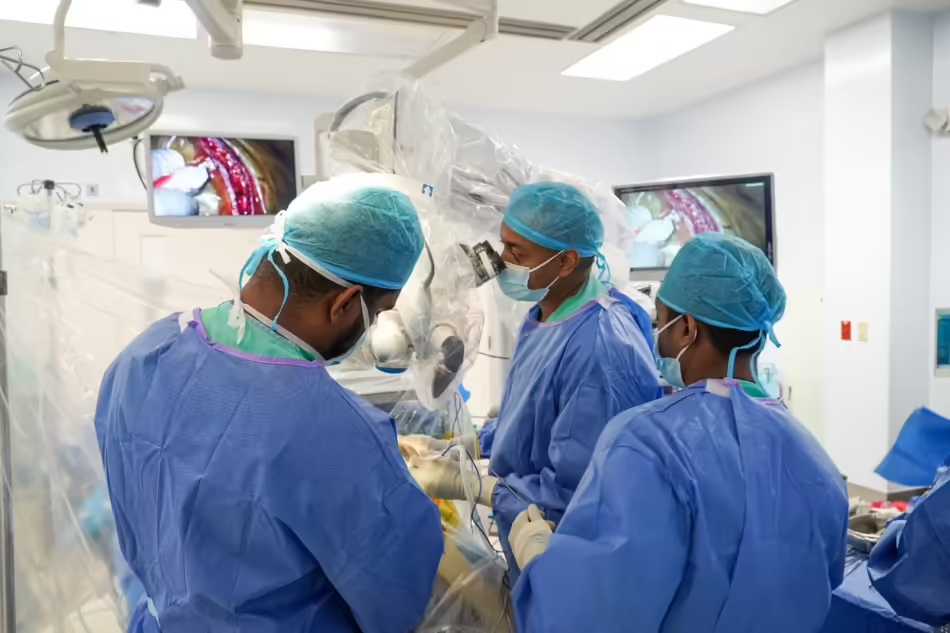Cayman HSA Marks Milestone with First Awake Craniotomy for Brain Tumor Resection

Dr Cooke performs HSA’s first awake craniotomy for brain tumour resection with the assistance of a team of surgeons, anaesthesiologists, nurses, and OR technicians.
The Health Services Authority (HSA) proudly announces a significant advancement in neurosurgical care with the successful completion of its first awake craniotomy for brain tumour resection, performed recently by its Neurosurgeon Dr Dwaine Cooke.
An awake craniotomy is a specialised neurosurgical technique where the patient remains conscious during critical stages of the surgery. This approach is essential when operating near vital brain regions responsible for functions such as speech, movement, and cognition. By keeping the patient awake, the surgical team can continuously monitor and test these functions in real-time, ensuring the tumour is removed safely and precisely while preserving essential neurological capabilities.
The patient, 38-year-old Emily Thompson (a pseudonym to protect her privacy), discovered the tumour unexpectedly whilst investigating an unrelated eye issue. The MRI conducted for the eye issue revealed a 4–5 centimetre tumour located near the speech centre of her brain. Initially monitored by her former neurosurgeon, who retired in recent years, Mrs Thompson’s condition changed earlier this year. She required more immediate and specialist intervention as the tumour exhibited changes in its growth pattern. It had increased in size over a short period of time raising concerns about potential aggression.
Upon diagnosis, Dr Cooke recommended an awake craniotomy to minimise the risk of impairing Mrs Thompson’s speech functions. “The tumour was located near her speech brain network, and it was crucial to continuously monitor her speech functions to minimise any potential damage,” explained Dr Cooke. “By asking her to speak, sing, and identify photos, we were able to ensure her cognitive functions remained intact throughout the surgery.”

Dr Cooke recommended an awake craniotomy to minimize the risk of impairing Mrs Thompson’s speech functions because the tumour was located near her speech-brain network.
Understanding the challenges and fears associated with an awake craniotomy, Dr Cooke and his team meticulously prepared Mrs Thompson for the procedure. They addressed her concerns about hearing the surgical instruments by heavily sedating her during the most intrusive parts of the surgery. “Mrs Thompson was understandably apprehensive about the drilling sounds,” Dr Cooke shared. “However, with thorough consultations and assurances about sedation protocols, she felt confident in proceeding with the awake surgery.”
To create a comforting environment, Mrs Thompson was asked to select her favourite music during the procedure. Her options included songs by Bob Marley, Adele and several K-pop songs, including one recommended by Anaesthesiologist Dr Judith Nicholls. “I told her I wanted to listen to BTS, and she recommended a song called “Standing Next to You” by Jung Kook, featuring Usher,” Mrs Thompson recalled. “Once the song started playing, I remember that I started singing softly and tapping my feet. When Dr Nicholls mentioned this to Dr Cooke during surgery, his voice seemed to be a little surprised but happy from what I recalled.”
“Honestly, I was very much at peace because the doctors explained everything very clearly, so I understood the process,” Mrs Thompson added.
This groundbreaking surgery was a collaborative effort involving a dedicated team of specialists, including Anaesthesiologists Dr Lorrise Williamson and Dr Judith Nicholls, Internal Medicine Physician Joel Assrope, neurophysiologists, and nurses such as the Operating Room Nurse Manager, Grace Boda. Nurse Boda reflected on the significance of the moment, “It was a historical experience for all of us. Seeing the patient engage with the surgical team while the tumour was being removed was inspiring.”

Dr Cooke, who has extensive training and experience performing a similar procedure in Jamaica, emphasised the importance of this achievement for the Cayman Islands. “This successful surgery highlights our ability to provide complex neurosurgical care right here in the Cayman Islands, eliminating the need for patients to travel overseas. We’re proud to offer this level of treatment and look forward to more advancements in patient care.”
Mrs Thompson expressed heartfelt gratitude for the exceptional care she received from the HSA team. “Dr Cooke explained every step of the surgery with patience and clarity, which eased my fears. Nurse Jody Ann Syms was incredibly helpful with all my questions and assisted in setting up my appointments. Dr Williamson – the care she took to answer the 20 million questions I had, as well as explain a few things multiple times, also goes to show how much she cares and understands what the patient is possibly feeling. On surgery day, Dr. Nicholls’ cheerful and positive vibes made me feel even more at ease. All the nurses who cared for me post-surgery were nothing short of phenomenal and ensured my recovery was smooth.”
The surgery was completed successfully, with the tumour being fully removed and pathology reports indicating that it is benign. “HSA is immensely proud of Dr. Cooke and the entire surgical team for their outstanding work on this historic procedure for the Authority,” stated HSA Medical Director Dr. Delroy Jefferson. “The successful completion of our first awake craniotomy demonstrates the expertise and compassion of our neurosurgical and medical teams. This achievement signifies significant progress in the quality of care we offer in the Cayman Islands, comparable to the care you would receive at some of the top medical facilities in larger jurisdictions.”
Mrs Thompson is currently recovering well and has exceeded expectations during her three-week check-up. However, her journey is not yet complete, as she will continue to undergo follow-up scans to monitor her recovery and ensure the tumour does not return.
“I’m focusing on healing and looking forward to getting healthier,” Mrs Thompson expressed. “I’ve seen photos of what you could look like after brain surgery and was bracing for it to be worse than what it turned out to be. There was little to no facial swelling or bruising, and that, to me, is a testament to the care I received during and after surgery. I’m grateful to God for watching over Dr Cooke and his team for such an amazing experience and outcome.”






